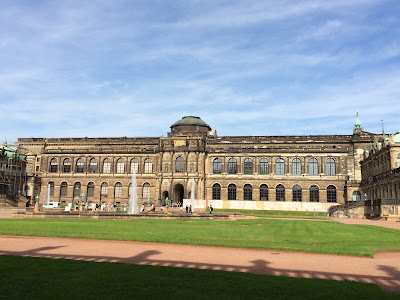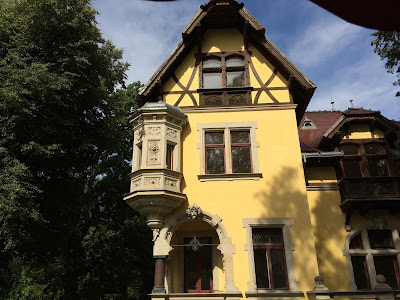Since we couldn't get our fill of beautiful Dresden in just one day, we and the Walkers spent another full day there. First of all we took the city's 22-stop all-city tour. We stayed on the bus, viewing all 22 stops and then chose to return to those stops that interested us the most. Many of our favorite places were within walking distance of our favorite, the Frauenkirche.
Did I mention that its humongous cement dome is an engineering marvel?!
View from the rainy top of the Frauenkirche taken the next morning!
The following buildings are all found surrounding the same town square as the Frauenkirche.
Each building was impressive in its own right.
One of the first nearby "things to see" was this 101 meter-long mural (way in the back), running a block long. It depicted hundreds of years of Germanic princes' rule and was painted on Meissen porcelain tiles. It was very, very impressive!
From there we went to the famed Zwinger (museum), which gave the impression of a castle with surrounding grounds. But it was actually built in the early 1700s by King Auguste the Strong as a showcase to display the treasures of the world he had amassed at that time.
The grounds were amazing!
The grounds were amazing!
Another museum there held nothing but pottery, and most of that was Oriental! Hundreds of beautiful vases and dishes! And then there was a room full of Meissen china and pottery. It was just unbelievable! Sis Walker "stole" a couple of shots while I created a diversion!
The buildings were impressive, and the one of the many museums there housed almost rivaled the Louvre, housing over 500,000 works of art! We saw the original "Sistine Madonna" by Rafael
and many others by Rembrandt, Rubens, Vermeer, Tizian, Durer, etc. During the Second World War, most of the paintings were evacuated for safe-keeping and were not damaged. After the end of the war, the paintings – like the holdings of many other museums – were taken by the Red Army to Moscow and Kiev. The treasures were eventually returned in 1955/56.
and many others by Rembrandt, Rubens, Vermeer, Tizian, Durer, etc. During the Second World War, most of the paintings were evacuated for safe-keeping and were not damaged. After the end of the war, the paintings – like the holdings of many other museums – were taken by the Red Army to Moscow and Kiev. The treasures were eventually returned in 1955/56.
Note the crowned entry to one of the outside entrances to the Zwinger.
More beautiful buildings in the neighborhood

This is the Royal Palace, one more incredibly beautiful building. The particular museum we went to there was called the "Green Vault" and was a Baroque treasure chest containing three floors of more than 2000 jewels, carvings, goldsmith art, ivory, gemstones, and statuettes. Unbelievable!!! This building and its treasures suffered severe damage in WWII but, like so many other buildings in beautiful Dresden, was restored to its former glory through extensive restoration.
View from inside the palace, looking down at one courtyard.
Some random beautiful homes seen on our city-wide bus tour:
Despite everything we saw and loved in Dresden, the awesome, newly restored Frauenkirche
will forever remain our favorite!!!
See the following link for photos before and after:
http://www.ldsdaily.com/world/20-unique-photos-frauenkirche-dresden-germany/
See the following link for photos before and after:
http://www.ldsdaily.com/world/20-unique-photos-frauenkirche-dresden-germany/































































